
“Did you hear the latest news?” “I know! It’s awful, but what can we do?” “JUST PRAY!”
“Did you hear about the natural disaster that struck?” “Yes, but since there’s nothing else we can do, JUST PRAY.”
“Do you see that poor person broken down on the side of the road?” “Yes, but since we’re in a hurry to get where we’re going, JUST PRAY.”
JUST PRAY. … JUST PRAY. … JUST PRAY. … JUST PRAY.
Have you noticed how many times we use this as the “ultimate solution” to everything God brings to our attention?
JUST PRAY. … JUST PRAY. … JUST PRAY. … JUST PRAY.
Is that REALLY the best you can do—JUST PRAY?
JUST PRAY. … JUST PRAY. … JUST PRAY. … JUST PRAY.
Are you and I so incompetent that we are good for nothing more than JUST PRAYING?
JUST PRAY. … JUST PRAY. … JUST PRAY. … JUST PRAY.
Have I said it enough?
JUST PRAY. … JUST PRAY. … JUST PRAY. … JUST PRAY.
Have you reached the point yet where you are you as sick of hearing this platitude as I am?
JUST PRAY. … JUST PRAY. … JUST PRAY. … JUST PRAY.
Is that all God expects of us when we see or hear of a problem or disaster?
JUST PRAY. … JUST PRAY. … JUST PRAY. … JUST PRAY.
Do not misunderstand me: I am NOT against prayer. I am NOT against asking for God’s omnipotent intervention in things we face in life—whether we can handle them ourselves or not. I am NOT against bringing these things to God’s attention.
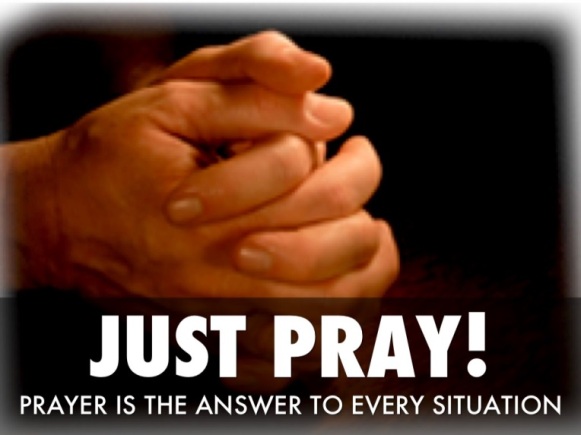
I AM, however, very much against using prayer as a magic wand to fix everything without having to DO anything beyond uttering the words.
I have heard more times than I could ever count the verses people use to invoke the “power of prayer” as the beginning, end and everything in between of our duty. Verses such as these:
“And whatsoever we ask, we receive of him, because we keep his commandments, and do those things that are pleasing in his sight.”
(1 John 3:22)“And this is the confidence that we have in him, that, if we ask any thing according to his will, he heareth us:”
(1 John 5:14)“I sought the LORD, and he heard me, and delivered me from all my fears. The eyes of the LORD are upon the righteous, and his ears are open unto their cry.”
(Psalm 34:14-15)“The righteous cry, and the LORD heareth, and delivereth them out of all their troubles.”
(Psalm 34:17)“Then shall ye call upon me, and ye shall go and pray unto me, and I will hearken unto you. And ye shall seek me, and find me, when ye shall search for me with all your heart.”
(Jeremiah 29:12-13)“Call unto me, and I will answer thee, and shew thee great and mighty things, which thou knowest not.”
(Jeremiah 33:3)“Ask, and it shall be given you; seek, and ye shall find; knock, and it shall be opened unto you: For every one that asketh receiveth; and he that seeketh findeth; and to him that knocketh it shall be opened.”
(Matthew 7:7-8; cf. Luke 11:9-13)“And all things, whatsoever ye shall ask in prayer, believing, ye shall receive.”
(Matthew 21:22)“Therefore I say unto you, What things soever ye desire, when ye pray, believe that ye receive them, and ye shall have them.”
(Mark 11:24)“And whatsoever ye shall ask in my name, that will I do, that the Father may be glorified in the Son.”
(John 14:13)“And in that day ye shall ask me nothing. Verily, verily, I say unto you, Whatsoever ye shall ask the Father in my name, he will give it you. Hitherto have ye asked nothing in my name: ask, and ye shall receive, that your joy may be full.”
(John 16:23-24)
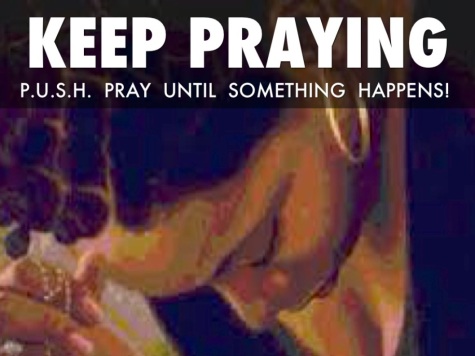
Let me reiterate: I am NOT against prayer and I am NOT saying that these verses are not to be used to demonstrate the need of a prayer life.
Are you facing a situation in which you need God’s strength and power to flow through you?
Then PRAY!
Are you struggling with something threatening to snuff out every last flicker of courage in your soul?
Then PRAY!
Do you need to stand in the presence of God to know you are not alone?
Then PRAY!
Do you need to repent of something you have done?
Then PRAY!
Do you lack the wisdom to handle a formidable situation in a godly manner?
Then PRAY!
The point of this post is not to say “don’t pray. Period.” What I want you to do right now is to take some time and consider the question I asked already:
Is prayer all God expects of us when we see or hear of a problem or disaster?
Before we take a closer look at what God expects in these situations, let’s take a moment to look at the word “pray.” If I were to ask you to define prayer, how would you define it? Would your definition look like any of these?
- to make petition or entreaty for; crave
- to offer devout petition, praise, thanks, etc., to God or to an object of worship
- to enter into spiritual communion with God or an object of worship through prayer
Is there even a chance you would have defined “pray” with its archaic meaning: “I beg you; please”? If your definition looks more like one of the first three definitions than the last one, you need to realize that the modern, non-archaic meanings have twisted themselves into something that reflects a skewed meaning of the original, “archaic” intent of the word.
When we look at the etymology (the study of the origin of words) of the word “pray,” we realize just how impotent the solution to “just pray” really is in almost every situation. Pray comes from the Latin word precari, meaning to “ask earnestly, beg, entreat.” Based upon this meaning, one way of describing “pray” is to say that we are in essence acting more like a needy toddler than a mature adult. This is why so often in Scripture “I pray” is used with the archaic meaning of “I beg you; please” and not the “offer devout petition to God” meaning.
Allow me to show you what I mean by that claim. In the King James Version (KJV), the word “pray” occurs 306 times. Of that only a third of the uses even have a word in the original languages (Hebrew, Aramaic, and Greek)—meaning that two-thirds of the uses in the KJV are implied in the mood and tense of the verbs used in those verses! However, the truth of the matter is that in only 32 instances (27% of the total uses of “pray” in the KJV) does the word “pray” in the original language actually come close to meaning what we think of when we say “pray”—that is to intercede on someone else’s behalf—and most instances of those are only used to describe what someone else is doing (e.g. Jesus or Abraham) and NOT a direct command for us to pray. In fact, when we look at the whole counsel of Scripture we will NEVER find it telling us that the beginning and end of our responsibility is to “pray.” So, what then are we supposed to do?
To begin with we need to accept that our responsibility is NOT to add the hashtag “#JustPray” (and YES, that really does exist!) to any or all comments we make online. We need to realize that prayer by its very nature is limited in what it can do—that’s why God created man, to be His “doers” and “effecters” in this world. Prayer is not a magic wand or special incantation that will automatically fix all of the problems we see or hear about without us having to lift a finger!
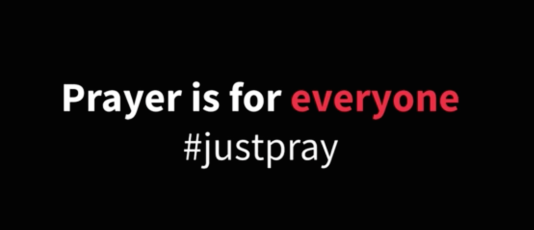
How can you say that prayer is severely limited? What about the great prayer warriors? I can hear these questions bouncing around in your minds. Since they do have a valid point, let’s look quickly at three examples people like to use for illustrating the power of and necessity for prayer:
Nehemiah
At the very beginning of the book of Nehemiah we see the concern Nehemiah has for the condition of those resettling in Jerusalem and Judah (1:1-3). Upon hearing the troubles facing the Jews, Nehemiah wept, mourned, fasted and prayed (1:4). It is well worth the time to look at not only what Nehemiah did, but also to look closely at what he prayed (1:5-11)—which was not a “God look how awful!” or “God help them through this struggle” prayer!
Nehemiah had a plan when he prayed and his plan was put in action. Four to five months after hearing the news of the conditions in Jerusalem (depending on whether these events happened in a Jewish leap year) we see Nehemiah back at his job (1:11-2:1). When confronted by the king for being visibly sad (2:2-4), Nehemiah sends up a quick prayer (2:4) and then lays out the petition for his plan of action to address the issue weighing heavily on his heart (2:5-8). Upon receiving the king’s approval for his plan, Nehemiah immediately steps into action—leaving Shushan (2:9-11), completing a thorough assessment of the situation shortly after arriving in Jerusalem (2:11-16), presenting his solution to those in Jerusalem (2:17-20), and erecting a wall with assistance (3:1-6:15). Throughout the first six chapters of the book we see a lot of action on Nehemiah’s part, but we only read of him praying (alone or with others) three times (1:4; 2:4; 4:9)!
In summary: Nehemiah heard terrible news and immediately turned to prayer. However, his prayer was not: “Oh those poor people! Please help them, Lord!” His prayer was one of whole-hearted repentance and supplication. He devised a mind-blowing plan on how to fix the problem, but knew he could not do it without God’s help. Then, months later, when the opportunity presented itself for him to set his plan into motion, he seized the opportunity (again with prayer) and did not relent, even in the face of formidable opposition, slander, and physical attacks. Nehemiah is being portrayed today as mighty prayer warrior, but his own book demonstrates that he was much more of a man of action than prayer. Prayer did not build the wall by itself, action built the wall—prayer merely opened the doors and paved the way for the action.

Elijah
The book of James tells us: “[Elijah] was a man subject to like passions as we are, and he prayed earnestly that it might not rain: and it rained not on the earth by the space of three years and six months. And he prayed again, and the heaven gave rain, and the earth brought forth her fruit” (5:17-18). You might be thinking, “See, he just prayed and God took care of everything!” Let’s find out if that really is the way the story occurred.
The account James is referencing is found in 1 Kings 17-18. At the beginning of the account, Elijah went to visit King Ahab and announced that there would be a drought for several years (17:1). Then, per God’s instructions, he went to a brook and was fed by God’s provision every morning and evening (17:2-6) until the brook dried up on account of the drought (17:7). Then God gave Elijah instructions to go and dwell in Zarephath and have a widow who lived there provide food for him during the drought (17:8-16). While he was there, the widow’s son died and he pleaded with God to have the boy come back to life (17:17-24). During the third year of the drought God told Elijah to go speak with King Ahab again and tell him of the promise of rain (18:1). So, Elijah does as he is told and issues the famous challenge to the prophets of Baal during his conversation with King Ahab (18:2-19).
The next scene in the account is the famous showdown on Mount Carmel (18:20-40). During this scene, Baal is shown to be impotent while God completely consumes both His waterlogged sacrifice and His completely drenched altar with fire after Elijah’s prayer (18:36-38). The people see the miraculous power of God, acknowledge God for who He is, and then killed all of the prophets of Baal. After the showdown, Elijah sends Ahab on his way (18:41) and then Elijah went to the top of Mount Carmel to pray for rain (18:42-44). After Elijah fervently prayed seven times, a rain cloud could be seen over the sea (18:44) and the rain returned (18:44-46).
Yes, Elijah prayed when he saw evil and sorrow—and effectually and fervently, just as James says (5:16-18). He also prayed when he saw the time of God’s will was at hand. However, Elijah didn’t “just pray.” Elijah spoke out against the evil prevalent in the land (e.g. 1 Kings 18:18-19). He obeyed the instructions God gave, immediately after receiving them. He lived out his faith, serving others in their times of need, and found ways to make God real to the people of his land in everything he said and did.
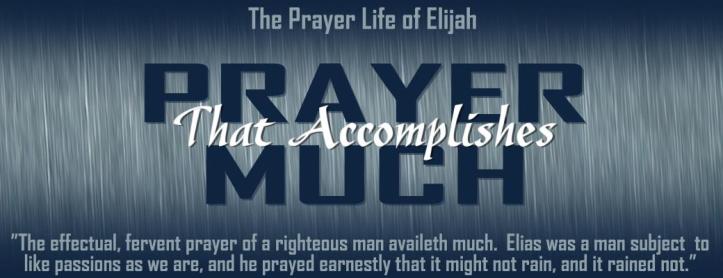
Jesus
For many people, the ultimate example of the power of prayer to accomplish the seemingly impossible was Jesus. Over the course of Jesus’ three-year ministry, there are apparently 25 recorded instances of Him praying. It’s important, though, to look closely at the prayers given in their context to see if the diversity of prayers is really as portrayed (like in the previous link). Here’s a breakdown of that list based upon typical focuses of modern prayer (not all of these verses use the words “pray” or “prayer”; some use words such as “cry” or “bless,” which can be loosely interpreted as prayer, but are so very much more):
- General prayers of unspecified purpose: Matthew 14:23; Mark 6:46; Luke 5:16; 6:12-13; 9:18, 28-29; 11:1; John 6:15
- Before an event: Matthew 26:36-46; Mark 14:32-42; Luke 3:21-22; 22:39-46
- For a person or people: Matthew 19:13-15; Mark 10:13-16; Luke 22:31-32; 23:34, 46; 24:50-51; John 11:41-42; 12:27-28; 17:1-26
- Before travelling: Mark 1:35-36
- Out of thanksgiving: Matthew 11:25-26; Luke 10:21-22
- Blessing food (e.g. grace before meals): Matthew 14:19; 15:36; 26:26-27; Mark 6:41; 8: 6-7; 14:22-23; Luke 9:16; 22:17-19; 24:30; John 6:11
- “Implied” prayer: Mark 7:34
It is amazing when you look closely at these examples from the Gospel accounts of Jesus’ prayer life to notice that not a single one of these prayers cited are a response to a situation or a person the way that the “just pray” supporters imply when they say:
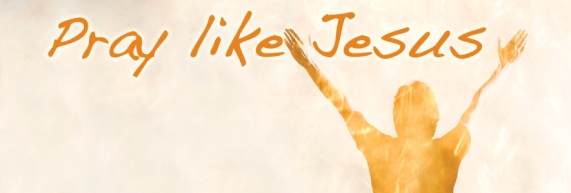
Apart from the 108 verses cited above, the rest of the accounts of Jesus’ ministry depict Him as dealing directly with people and situations. So, if you are going to “pray like Jesus,” you need to DO SOMETHING about the situations you see and hear about rather than “just praying.” Jesus’ ministry put hands and feet to His requests and He modeled that for all of His followers.
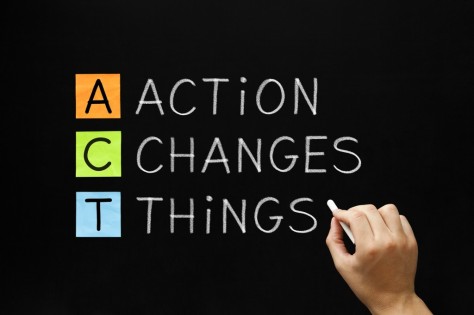
Which brings us back to the main question of this post: “Is prayer all God expects of us when we see or hear of a problem or disaster?” As we can see from the above three examples of “great prayer warriors,” the answer is a resounding “NO!” Yes, we are to pray, but our responsibility is not to “just pray.” If we are to be effectual and fervent prayer warriors like Elijah, Nehemiah and Jesus, then we need to put feet and hands to our prayers—we MUST reach out and meet the needs with our direct involvement. If God brings something to our attention, He expects us to be the ones to go to the point of need and reach out. “Just praying” is not enough.

DO SOMETHING!!!
